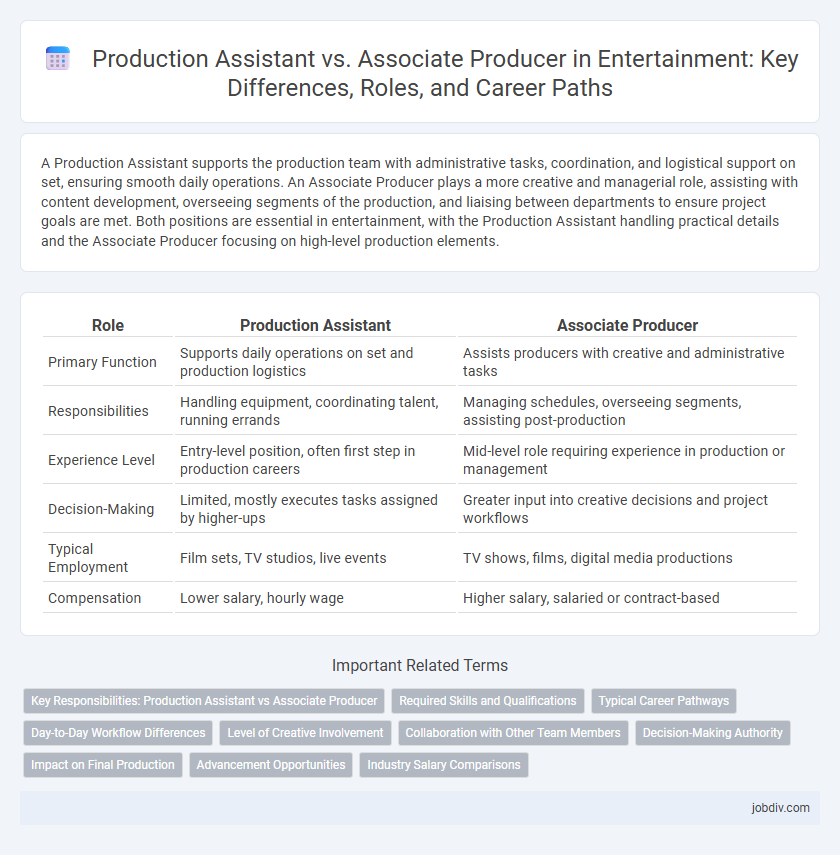A Production Assistant supports the production team with administrative tasks, coordination, and logistical support on set, ensuring smooth daily operations. An Associate Producer plays a more creative and managerial role, assisting with content development, overseeing segments of the production, and liaising between departments to ensure project goals are met. Both positions are essential in entertainment, with the Production Assistant handling practical details and the Associate Producer focusing on high-level production elements.
Table of Comparison
| Role | Production Assistant | Associate Producer |
|---|---|---|
| Primary Function | Supports daily operations on set and production logistics | Assists producers with creative and administrative tasks |
| Responsibilities | Handling equipment, coordinating talent, running errands | Managing schedules, overseeing segments, assisting post-production |
| Experience Level | Entry-level position, often first step in production careers | Mid-level role requiring experience in production or management |
| Decision-Making | Limited, mostly executes tasks assigned by higher-ups | Greater input into creative decisions and project workflows |
| Typical Employment | Film sets, TV studios, live events | TV shows, films, digital media productions |
| Compensation | Lower salary, hourly wage | Higher salary, salaried or contract-based |
Key Responsibilities: Production Assistant vs Associate Producer
Production Assistants manage logistical tasks on set, including coordinating schedules, handling equipment, and assisting various departments to ensure smooth daily operations. Associate Producers oversee specific segments of production, contributing to creative decision-making, managing budgets, and liaising between producers and crew to maintain project timelines. Both roles support the production process but differ significantly in scope and level of responsibility.
Required Skills and Qualifications
Production Assistants require strong organizational skills, attention to detail, and basic knowledge of film set operations, typically needing a high school diploma or equivalent and on-the-job training. Associate Producers must possess advanced project management abilities, excellent communication, and a deep understanding of production workflows, often requiring a bachelor's degree in film, media, or related fields and relevant industry experience. Both roles benefit from proficiency in scheduling software, multitasking, and problem-solving to support efficient production processes.
Typical Career Pathways
Production Assistants often begin in entry-level roles handling on-set logistics and support, gaining hands-on experience in film or television production. With industry knowledge and networking, they may progress to Associate Producer positions, which involve greater creative input, project coordination, and sometimes budget oversight. Typical career pathways emphasize advancing from technical support roles to leadership positions within production teams.
Day-to-Day Workflow Differences
Production Assistants handle on-set logistics, coordinating schedules, managing equipment, and facilitating communication between departments, ensuring smooth daily operations. Associate Producers focus on creative input, overseeing specific segments of production, liaising with talent, and assisting in post-production tasks such as editing and content review. The Production Assistant's role is more operational and entry-level, while the Associate Producer works with greater creative responsibility and strategic decision-making in the entertainment workflow.
Level of Creative Involvement
Production Assistants typically handle logistical and administrative tasks, ensuring smooth daily operations on set with limited creative input. Associate Producers engage more actively in the creative process, collaborating with key departments to influence the content, tone, and vision of the project. This higher level of creative involvement distinguishes Associate Producers as essential contributors to the storytelling and artistic development of entertainment productions.
Collaboration with Other Team Members
Production Assistants support multiple departments by coordinating schedules, managing logistics, and facilitating communication to ensure smooth daily operations on set. Associate Producers collaborate closely with directors, editors, and writers to oversee creative processes, contribute to content development, and maintain project consistency. Effective teamwork between Production Assistants and Associate Producers enhances overall production efficiency and strengthens interdepartmental communication.
Decision-Making Authority
Production Assistants support daily operations with limited decision-making authority, primarily executing tasks assigned by higher-level staff. Associate Producers hold greater decision-making power, often managing segments of production, coordinating schedules, and making creative or logistical decisions under the producer's guidance. Their enhanced authority impacts project workflows and overall production efficiency significantly.
Impact on Final Production
A Production Assistant supports daily operations by managing logistics and coordinating on-set tasks, ensuring smooth workflow and timely execution of production schedules. An Associate Producer influences creative decisions and oversees specific segments, directly shaping content quality and narrative coherence. Both roles impact the final production, with the PA maintaining operational efficiency and the Associate Producer enhancing creative and editorial outcomes.
Advancement Opportunities
Production Assistants often begin with entry-level tasks such as coordinating schedules and handling logistics, providing a foundation for learning the industry's workflow. Advancement opportunities typically lead from Production Assistant to roles like Associate Producer by gaining experience, demonstrating leadership, and building strong industry networks. Associate Producers take on greater responsibilities in managing creative content and production processes, positioning themselves for senior production roles and eventually executive producer positions.
Industry Salary Comparisons
Production Assistants in the entertainment industry typically earn an average salary between $30,000 and $45,000 annually, reflecting entry-level responsibilities. Associate Producers command higher salaries, often ranging from $60,000 to $90,000, due to their increased oversight and creative input in production processes. Salary disparities also depend on factors such as project scale, geographic location, and union affiliations within the industry.
Production Assistant vs Associate Producer Infographic

 jobdiv.com
jobdiv.com